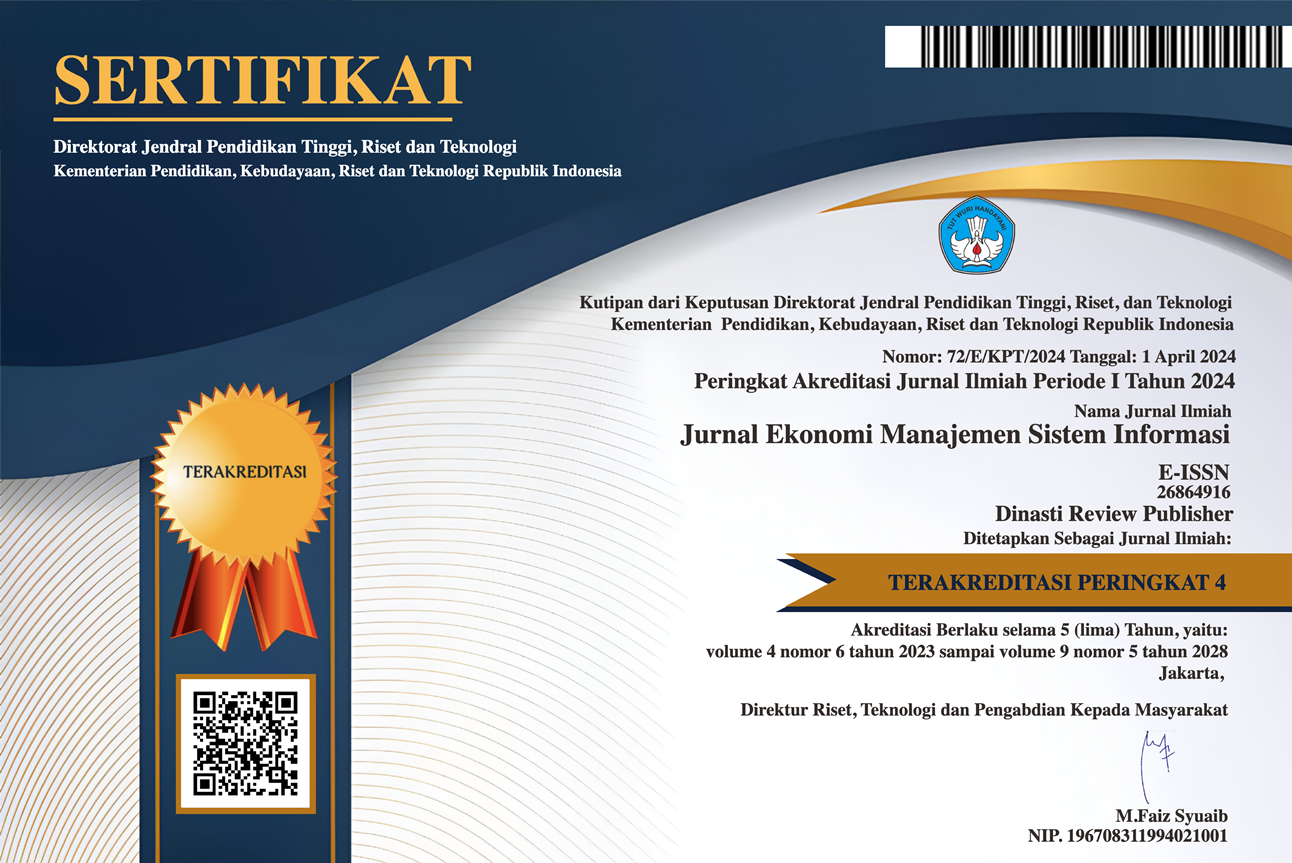Implementation of Social Media Marketing, Brand Trust, Brand Satisfaction in Increasing Consumer Loyalty to Skincare Products
Keywords:
Customer Satisfaction, Social Media SkincareAbstract
Social media also helps in the dissemination of promotional information and product usage experiences. The development of the beauty and skincare industry has become significant due to the awareness of the importance of maintaining healthy skin, especially in urban areas with high levels of pollution. The use of skincare products has become an inevitable trend, both among women and men, including children who are starting puberty. Price factors, promotions, product quality, and recommendations from close people greatly influence the decision to purchase skincare products. The beauty industry in Indonesia, which is the third largest market in Asia, shows great potential with increasing export levels. Awareness of skincare not only provides physical benefits but also positive psychological impacts, such as increasing self-confidence and providing relaxation. Thus, skincare practices have become an important part of a healthy and sustainable lifestyle.
References
Abbas, M. (2024). SEIKO: Journal of Management & Business The Influence of Brand Image and Customer Satisfaction on Customer Loyalty . 7 (1), 131–139.
Atmaja, DR, & Rahayu, P. (2023). The Effect of Celebrity Endorsement and Social Media Marketing on Purchase Intention of Skincare Product in Tiktok Shop. Scientific Journal of Wisdom , 20 (2), 280–292. https://doi.org/10.31334/bijak.v20i2.3409
Filaili, FY, & Roostika, R. (2024). Dynamic Management Journal The Influence of Social Media Marketing Activities, Brand Trust and Perceived Value on Purchase Intentions of Skincare Product Consumers Dynamic Management Journal . 6 (2), 64–71.
Cognition, PK, Risk, P., Types, AND, Bidori, F., Puspitowati, LI and I., Wijaya, IGB, Alifah, U., Article, I., Paedagoria, SN, Anwar, I., Jamal, MT, Saleem, I., Thoudam, P., Hassan, A., Anwar, I., Saleem, I., Islam, KMB, Hussain, SA, Witcher, BJ, … alma. (2021). No????????????????????? ?????????????????Title. Industry and Higher Education , 3 (1), 1689–1699. http://journal.unilak.ac.id/index.php/JIEB/article/view/3845%0Ahttp://dspace.uc.ac.id/handle/123456789/1288
Nurafridha, Meisya Regita, & Listiana, E. (2023). Factors influencing product repurchase decisions. Management Business Innovation Conference , 141–150.
Nursyamsi, J., Sukirman, E., & Haryono, H. (2023). Analysis of Loyalty-Forming Factors in Skincare Products. Multidisciplinary Scientific Journal , 2 (03), 21–25. https://doi.org/10.56127/jukim.v2i03.615
Pauzy, DM, Economy, F., Business, D., & Perjuangan Tasikmlaya, U. (2021). Volume 6 Number 2 August 2021 Edition MEASURING CONSUMER SATISFACTION OF SKIN CARE PRODUCTS THROUGH PRODUCT QUALITY Arga Sutrisna . 6 , 143–150.
Pertiwi, AB, Ali, H., & Sumantyo, FDS (2022). Factors Affecting Customer Loyalty; Analysis of Price Perception, Service Quality and Customer Satisfaction (Marketing Management Literature Review). Journal of Applied Management Science , 3 (6), 582–591.
Peter and Olson, 2000:228. (2019). CUSTOMER LOYALTY Faculty of Economics and Business, Udayana University, Bali, Indonesia The development of economy, technology and culture in the era of globalization such as today has caused human needs to grow, not only limited to the needs of p. 2000 , 8 (1), 7044–7072.
Rahmawati, A., Padmantyo, S., & Setyawan, AA (2023). The Influence of Digital Service Quality, Product Trust on Customer Satisfaction of Local Skincare Products. Journal of Creative Management & Business , 8 (2), 1–23. https://jsr.lib.ums.ac.id/index.php/determinasi/article/view/35%0Ahttps://jsr.lib.ums.ac.id/index.php/determinasi/article/download/35/33
Downloads
Published
How to Cite
Issue
Section
License
Copyright (c) 2024 Henny Sidabutar, Febriansyah Febriansyah

This work is licensed under a Creative Commons Attribution 4.0 International License.
Hak cipta :
Penulis yang mempublikasikan manuskripnya di jurnal ini menyetujui ketentuan berikut:
- Hak cipta pada setiap artikel adalah milik penulis.
- Penulis mengakui bahwa Jurnal Ekonomi Manajemen Sistem Informasi (JEMSI) berhak menjadi yang pertama menerbitkan dengan lisensi Creative Commons Attribution 4.0 International (Attribution 4.0 International CC BY 4.0) .
- Penulis dapat mengirimkan artikel secara terpisah, mengatur distribusi non-eksklusif manuskrip yang telah diterbitkan dalam jurnal ini ke versi lain (misalnya, dikirim ke repositori institusi penulis, publikasi ke dalam buku, dll.), dengan mengakui bahwa manuskrip telah diterbitkan pertama kali di Jurnal Ekonomi Manajemen Sistem Informasi (JEMSI).










































































